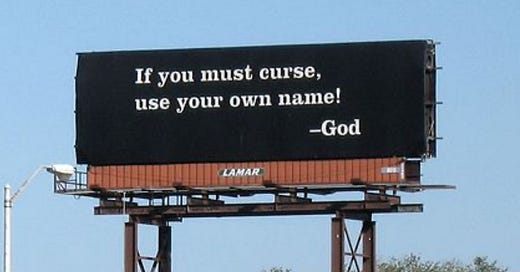Berenson v Biden gets good news
The Supreme Court unanimously (!) tossed out a case that the Biden Administration had relied on to justify its censorship
When James Lawrence and I filed Berenson v Biden last year to hold White House and Pfizer officials to account for censoring my 2021 reporting on the mRNA Covid vaccines, we knew our case was strong.
But one precedent, a decision called National Rifle Association v Vullo, presented a challenge because it set a very high bar for government efforts to use third parties as censors.
NRA v Vullo was decided in the Second Circuit of Appeals, the same federal circuit that includes the court hearing Berenson v Biden. The Second Circuit ruled in September 2022 that a New York state regulator had not violated the NRA’s First Amendment rights when she pushed insurers to stop doing business with the NRA over its firearms advocacy.
As we expected, the defendants relied heavily on NRA v Vullo when they asked federal Judge Jessica G.L. Clarke to dismiss Berenson v Biden. In fact, the Justice Department mentioned Vullo far more than any other case in its motion to dismiss last August.
But we don’t have to worry about NRA v Vullo anymore.
—
(Support Unreported Truths. Support Berenson v Biden. Support free speech. All for 20 cents a day.)
—
On May 30, the Supreme Court unanimously reversed the Second Circuit’s decision in NRA v Vullo, ruling that:
The NRA plausibly alleged that respondent [Vullo] violated the First Amendment by coercing regulated entities [insurance companies and banks] to terminate their business relationships with the NRA in order to punish or suppress gun-promotion advocacy.
Justice Sonia Sotomayor, one of the court’s most liberal members, wrote the decision.
Sotomayor’s authorship is doubly noteworthy because Sotomayor served as a Second Circuit appellate judge before joining the Supreme Court.1
It’s triply noteworthy because in striking down the 2022 NRA decision, Sotomayor and the Supreme Court cited as precedent a 2003 Second Circuit ruling called Okwedy v Molinari. Okwedy is very favorable to Berenson v Biden - and Okwedy’s suit was much more analogous to my lawsuit than Vullo, which is now off the table in any case.
In Okwedy, a three-judge Second Circuit panel unanimously found Guy Molinari, the then-borough president of Staten Island, had violated the First Amendment when he pushed a billboard company to take down a billboard with an anti-gay slogan. The appellate judges reversed a district court ruling dismissing a lawsuit against Molinari from Kristopher Okwedy, the pastor whose church had paid for the billboard. They wrote that:
a public-official defendant who threatens to employ coercive state power to stifle protected speech violates a plaintiff's First Amendment rights even if the public-official defendant lacks direct regulatory or decisionmaking authority over the plaintiff or a third party that facilitates the plaintiff's speech.
The Second Circuit went on to explain that in dismissing the lawsuit:
The district court relied heavily on… the fact that Molinari did not have direct regulatory or decisionmaking authority over PNE [the billboard company]… [but] a defendant without such direct regulatory or decisionmaking authority can also exert an impermissible type or degree of pressure.
—
(God loves billboards! And the First Amendment…)
—
Best of all, Sonia Sotomayor was one of the three Second Circuit judges on that 2003 opinion! Now - in her NRA opinion - she and the rest of the Supreme Court have reaffirmed that:
[T]he First Amendment prohibits government officials from wielding their power selectively to punish or suppress [emphasis added] speech, directly or (as alleged here) through private intermediaries.
Further, the Supreme Court repeatedly explained in its decision that the problematic conduct must be “viewed in context.” In other words, courts should judge all the anti-speech actions together, rather than parsing them.
Similarly, in Berenson v Biden, the defendants worked together on a multi-month campaign that ultimately gave Twitter no choice but to violate its own contract with me and ban me.
Before the end of the month, the Supreme Court is almost certain to rule on the case now known as Murthy v Missouri - about a broad swath of government efforts at social media censorship. That decision will jumpstart Berenson v Biden, which has essentially been on hold as Judge Clarke waits for the Supreme Court to rule on first the NRA case and now Murthy.
I don’t know what the Court will do in Murthy. But Berenson v Biden is already in an even stronger position thanks to its NRA decision. And I hope very soon to have an most interesting piece of news for you…
In the meantime, should you be so inclined, you can support B v B here:
https://www.givesendgo.com/G9X98
https://www.gofundme.com/f/berenson-v-biden-and-pfizers-albert-bourla
Or Venmo: Alex-Berenson-3 - last four digits of my phone are 1745.
Or send a check to Envisage Law, 601 Oberlin Rd #100, Raleigh, NC 27608
—
(Or just subscribe!)
—
The case has been cheap for a while, as we and defendants wait for the Supreme Court’s rulings. I have reason to believe it will get expensive soon, for a most… interesting… reason.
Ladies and gentlemen, start your engines.
I hear she is also a solid small-stakes poker player, but that’s another story.





I think we lost sight of how horribly free speech was attacked during the Covid fraud. It’s discouraging that it’s taking this long to begin to right the wrongs. Regrettably, these delays encourage more government wrongdoing. Justice delayed is justice denied.
Great news. I'll add that the first (and all) amendments in the BoR were backstops and not the first line of defense against government power. Over the last century and more the left has flipped the concept from enumerated powers to a enumerated liberties. And now the Bill of Rights is the only thing protecting many freedoms in the United States.